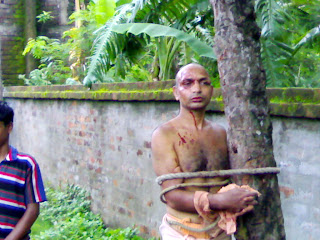Time to assert “Back to Basics”
The call of “Back to Basics” in history has been
one of the most preferential statements of a community in distress; to be
precise, when it is under a threat of relentless onslaughts or when it is
experiencing worst form of persecution on religious or linguistic or even
racial grounds and doesn't know how to repel to retain its own right to exist.
At such critical junctures, when all avenues are found to be abortive and succor
can’ be obtained even, contemplation of bascs or thoughts, acts of giants on
the same issue remains mostly important. Hindu Nationalism in Bengal having its
formal onset in “Anandamath” penned by Bankimchandra Chatterjee and published
in 1882 has travelled much by now but is yet to have its cherished success. Several
factors have been stated for its failure; while on one hand the movement has
failed to exploit historic opportunities in the state to resurrect its own
destiny robustly, approaches of its wishy-washy leadership at times to turn the
basic concept into an all-encompassing ideology has also been a great obstacle.
According to historians, there has never been any amity between Hindus and
Muslims in the history of Bengal despite Hindu wishes for such a rosy day are
yet to die down. Now, while Bengali Hindu community has become almost a
microscopic entity in Bangladesh, its predominance in the Indian state of
Bengal is also dwindling fast and if anything is accountable behind this
historic debacle, it is nothing save for the community’s erroneous belief.
Hence, it is the time to ponder whether
thoughts to preserve Hindu identity in Bengal came up earlier. Even if
Rabindranath Tagore is more pained with colors of universalism, he was not
alien to this danger. This is best depicted in his tribute to Swami
Shraddhanand alias Lala Munshiram, highly reputed Hindu educationist and also reformer
of Arya Samaj who was killed a by an Islamist named Abdul Rashid on December
23, 1926. Tagore, in his tribute, wrote without qualm, "We
suffered from many dangers, but we could never be united. When Mohammed Ghouri
brought the first blow from outside, the Hindus could not be united, even in the
those days of imminent danger. When the Muslims started to demolish the temples
one after another, and to break the idols of Gods and Goddesses, the Hindus
fought and died in small units, but they could not be united. It has been
provided that we were killed in different ages due to our discord.”
He was
not alone; Sarat Chandra Chatterjee, globally acclaimed Bengali novelist,
echoed the same views as well. He stated in clear terms in Bartaman Hindu-Mussalman
Samasya (literally, Contemporary Hindu-Muslim Problem),
“If we go by the lessons of history we have to accept that the goal of
the Hindu-Muslim unity is a mirage. When Muslims first entered India, they
looted the country, destroyed the temples, broke the idols, raped the women and
heaped innumerable indignities on the people of this country. Today it appears
that such noxious behavior has entered the bone marrow of Muslims. Unity can be
achieved among equals…. I am of the view that Hindu-Muslim unity, which could
not be achieved during the last thousand years, will not materialize during the
ensuing thousand years.”
Perhaps
there is no need of introducing Sri Aurobindo, Hindu nationalist and Yogi, who
has left profound contributions through his works. He stated in one of his
writings, “You can live amicably with a religion whose principle is toleration.
But how is it possible to live with a religion whose principle is ‘I will not
tolerate’? You cannot build unity on such basis. Perhaps the only way of making
the Mohammedans harmless is to make them lose their faith in their religion.”
Intellectual
giants, through their writings, have depicted how the fate of Hindus, not in Bengal
only but across India also, has been harmed by persistent assaults of Islamists
through centuries. They have tried to make Hindus conscious of the brutal reality
and also of their own fate provided that they remain inclined to the saga of universalism
cloaked in flags of global fraternity. All Hindus have got to do is to discern
this basic truth or basics and frame their strategies accordingly to preserve Dharma.
Hindu Samhati regularly
monitors and reports violations against Hindus in West Bengal. We also work
with both governmental and NGO agencies for proper education on protection and
ensure remedies to the Hindu populace as per prevailing law of the land.






Comments